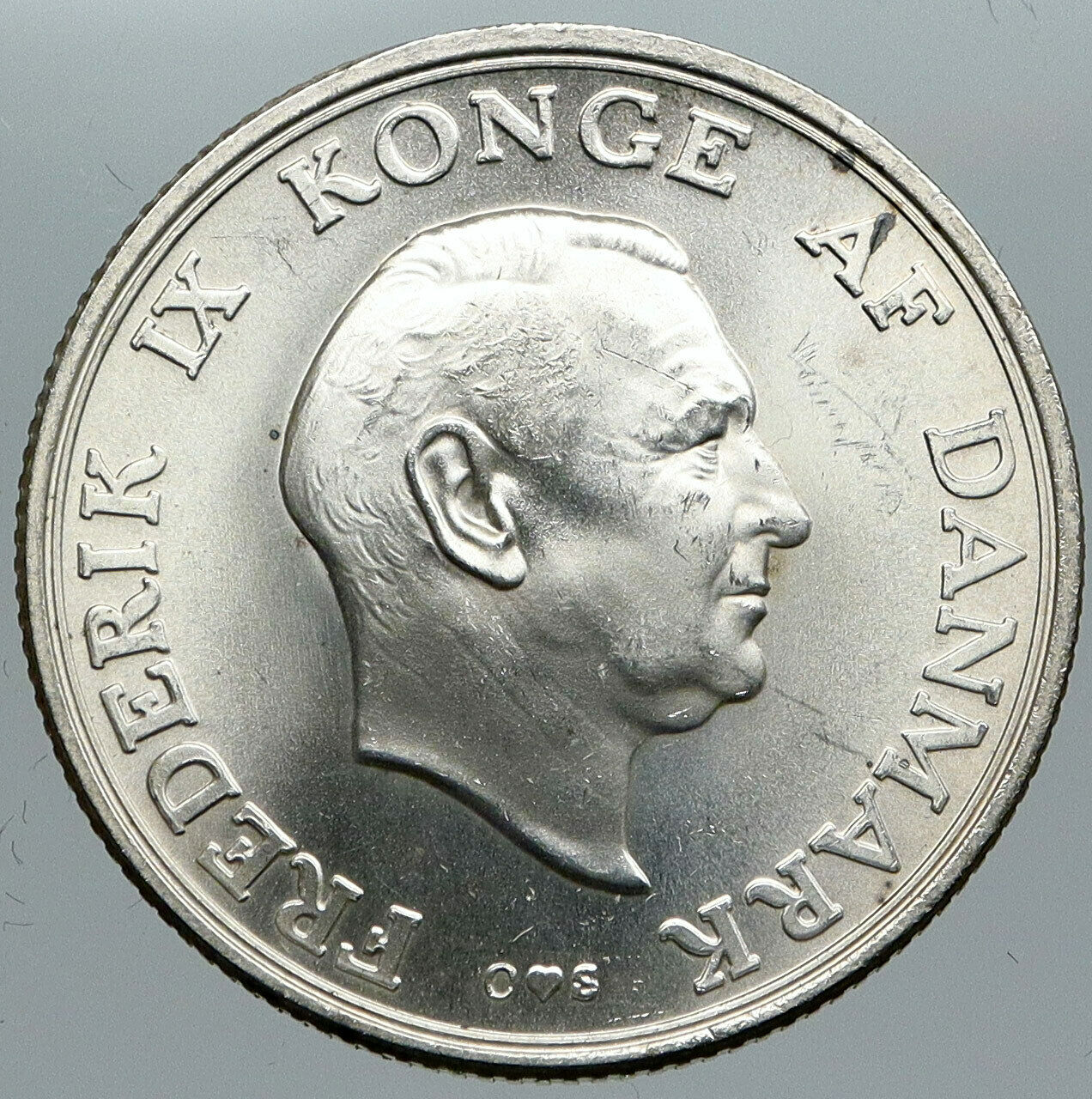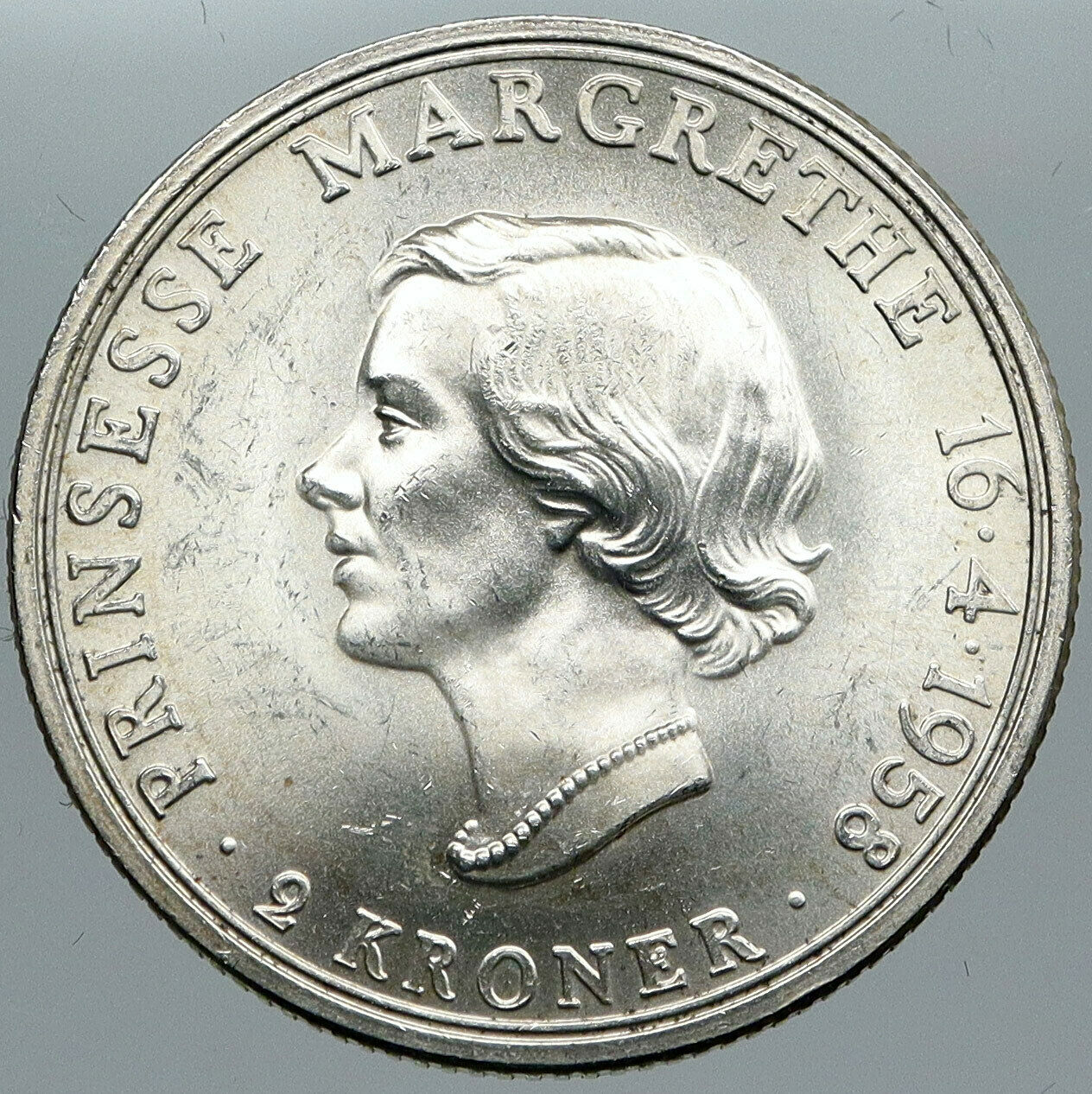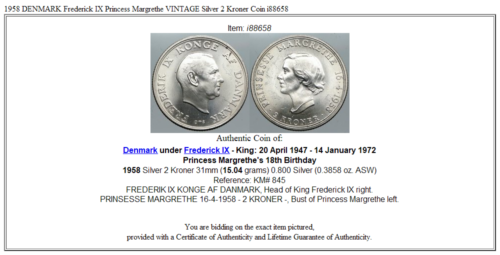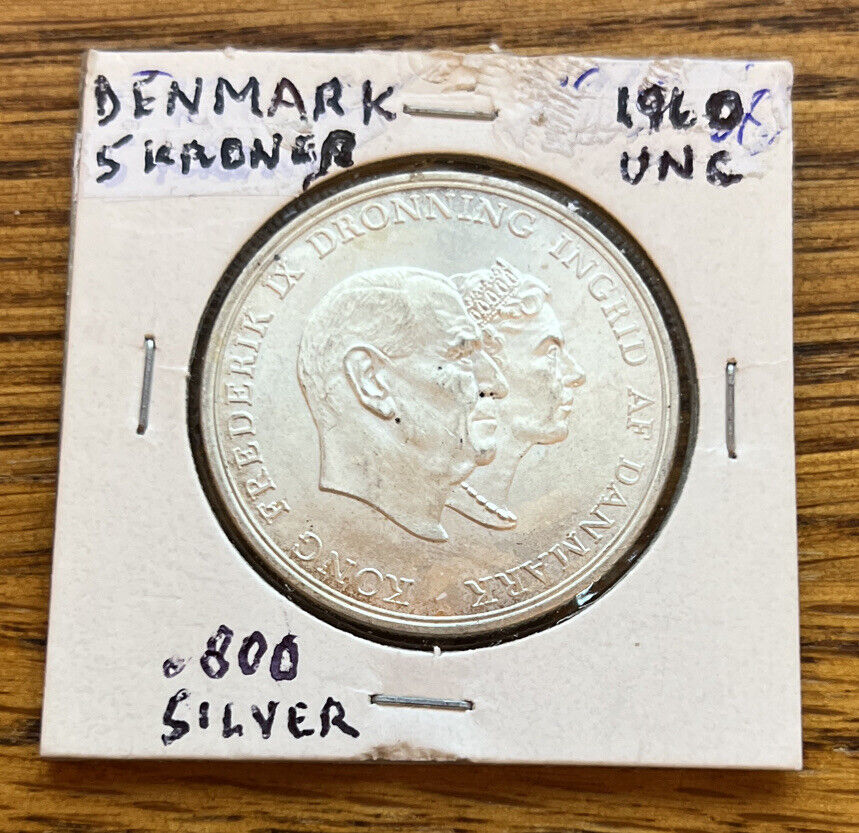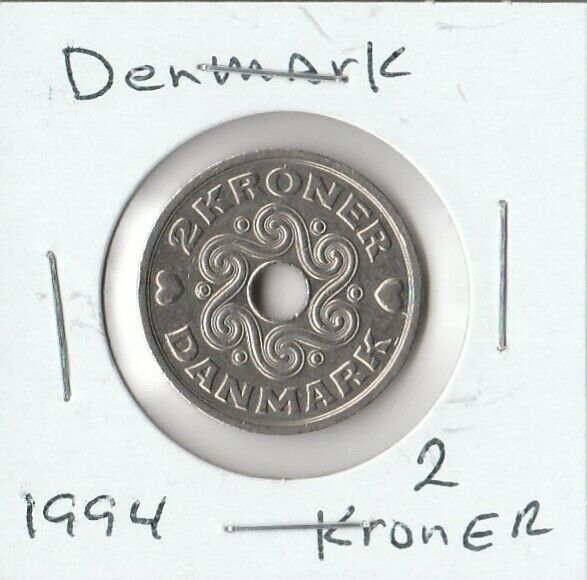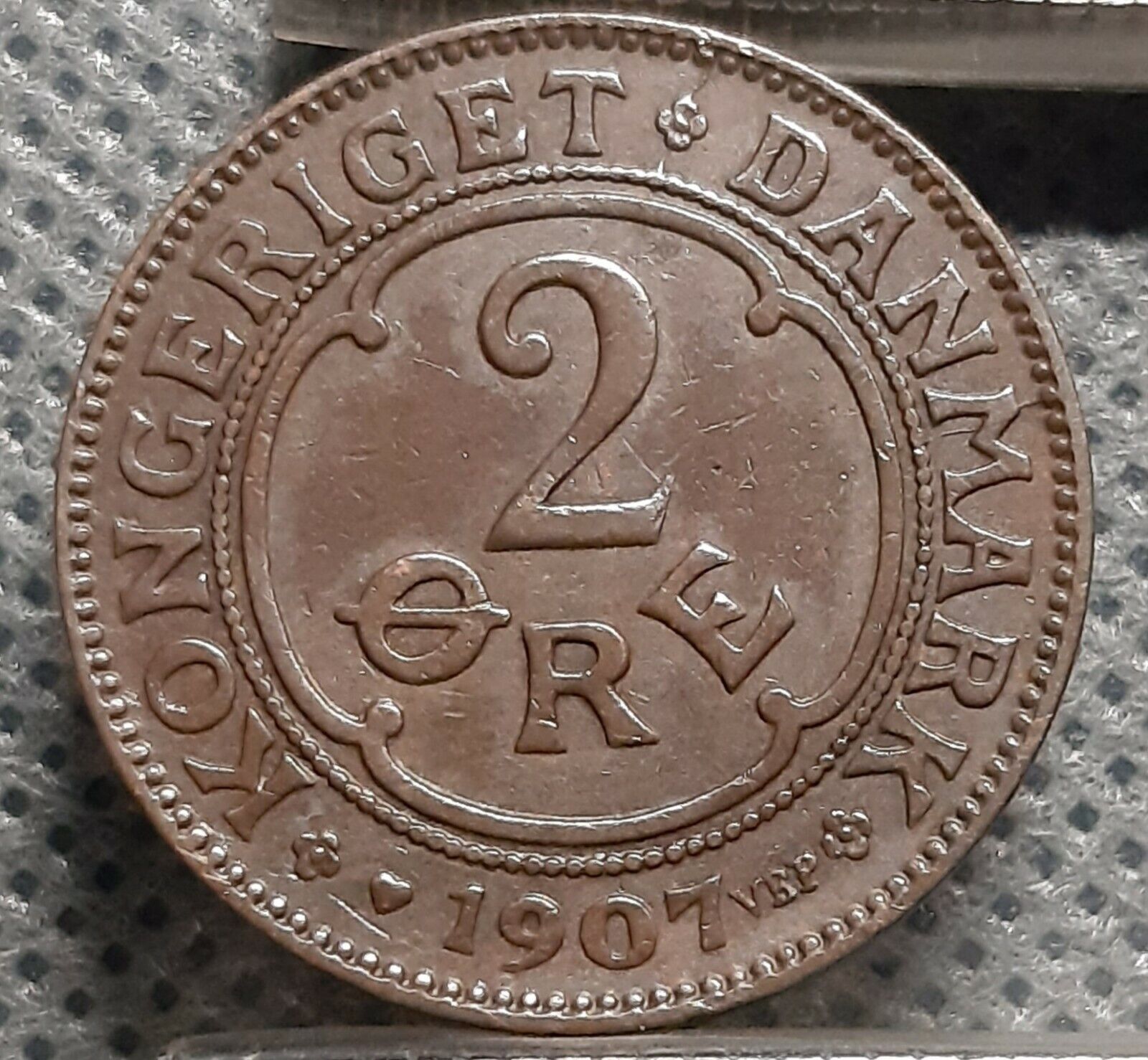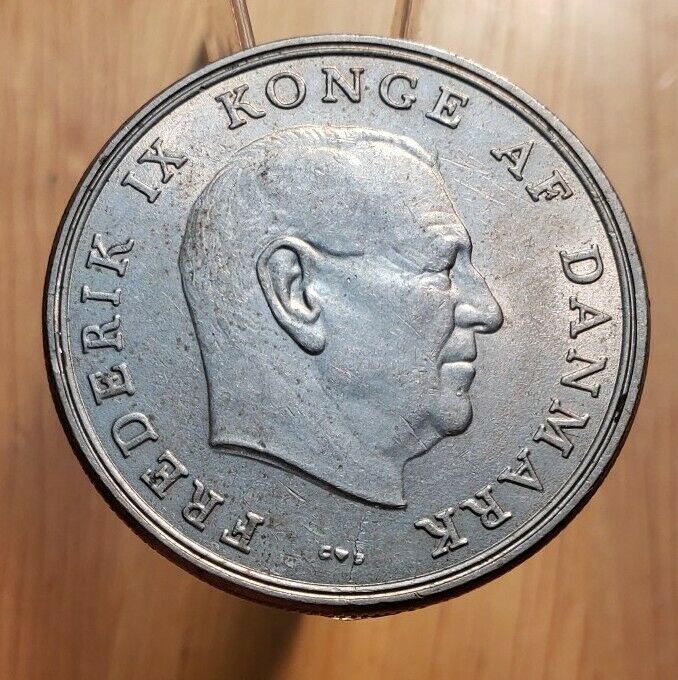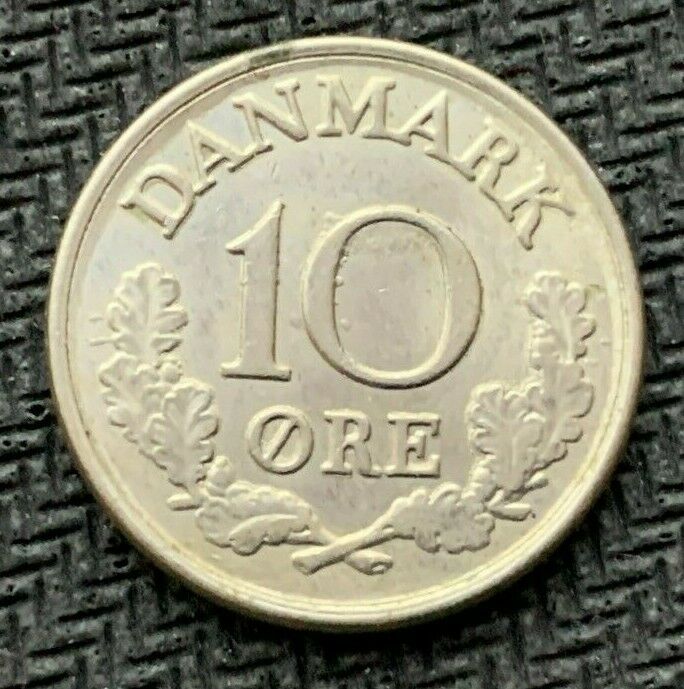-40%
1958 DENMARK Frederick IX Princess Margrethe VINTAGE Silver 2 Kroner Coin i88658
$ 94.32
- Description
- Size Guide
Description
Item:i88658
Authentic Coin of:
Denmark
under
Frederick IX
- King: 20 April 1947 - 14 January 1972
Princess Margrethe's 18th Birthday
1958
Silver 2 Kroner 31mm (
15.04
grams) 0.800 Silver (0.3858 oz. ASW)
Reference: KM# 845
FREDERIK IX KONGE AF DANMARK, Head of King Frederick IX right.
PRINSESSE MARGRETHE 16-4-1958 - 2 KRONER -, Bust of Princess Margrethe left.
You are bidding on the exact item pictured, provided with a Certificate of Authenticity and Lifetime Guarantee of Authenticity.
Margrethe II
(Danish: Margrethe 2., pronounced [mɑˈɡʁæːˀdə]; Faroese: Margreta 2.; Greenlandic: Margrethe II; full name: Margrethe Alexandrine Þórhildur Ingrid; born 16 April 1940) is the Queen of Denmark; as well as the supreme authority of the Church of Denmark and Commander-in-Chief of the Danish Defence. Born into the House of Glücksburg, a royal house with origins in Northern Germany, she was the eldest child of Frederick IX of Denmark and Ingrid of Sweden. She succeeded her father upon his death on 14 January 1972, having become heir presumptive to her father in 1953, when a constitutional amendment allowed women to inherit the throne. On her accession, Margrethe became the first female monarch of Denmark since Margrethe I, ruler of the Scandinavian kingdoms in 1375-1412 during the Kalmar Union. In 1967, she married Henri de Laborde de Monpezat, with whom she has two sons: Crown Prince Frederik and Prince Joachim. She has been on the Danish throne for 46 years, becoming the second-longest-reigning Danish monarch after her ancestor Christian IV.
Succession
Shortly after King Frederick IX delivered his New Year's Address to the Nation at the 1971/72 turn of the year, he fell ill. At his death 14 days later, 14 January 1972, Margrethe succeeded to the throne at the age of 31, becoming the first female Danish sovereign under the new Act of Succession. She was proclaimed Queen from the balcony of Christiansborg Palace 15 January 1972, by Prime Minister Jens Otto Krag. Queen Margrethe II relinquished all the monarch's former titles except the title to Denmark, hence her style "By the Grace of God, Queen of Denmark" (Danish: Margrethe den Anden, af Guds Nåde Danmarks Dronning). The Queen chose the motto: God's help, the love of The People, Denmark's strength.
In her first address to the people, Queen Margrethe II said:
My beloved father, our King, is dead. The task that my father had carried for nearly 25 years is now resting on my shoulders. I pray to God to give me help and strength to carry the heavy heritage. May the trust that was given to my father also be granted to me.
Constitutional role
The Queen's main tasks are to represent the Kingdom abroad and to be a unifying figure at home. She receives foreign ambassadors and awards honours and medals. The Queen performs the latter task by accepting invitations to open exhibitions, attending anniversaries, inaugurating bridges, etc.
As an unelected public official, the Queen takes no part in party politics and does not express any political opinions. Although she has the right to vote, she opts not to do so to avoid even the appearance of partisanship.
After an election where the incumbent Prime Minister does not have a majority behind him or her, the Queen holds a "Dronningerunde" (Queen's meeting) in which she meets the chairmen of each of the Danish political parties.
Each party has the choice of selecting a Royal Investigator to lead these negotiations or alternatively, give the incumbent Prime Minister the mandate to continue his government as is. In theory each party could choose its own leader as Royal Investigator, the social liberal Det Radikale Venstre did so in 2006, but often only one Royal Investigator is chosen plus the Prime Minister, before each election. The leader who, at that meeting succeeds in securing a majority of the seats in the Folketing, is by royal decree charged with the task of forming a new government. (It has never happened in more modern history that any party has held a majority on its own.)
Once the government has been formed, it is formally appointed by the Queen. Officially, it is the Queen who is the head of government, and she therefore presides over the Council of State (privy council), where the acts of legislation which have been passed by the parliament are signed into law. In practice, however, nearly all of the Queen's formal powers are exercised by the Cabinet of Denmark.
In addition to her roles in her own country, the Queen is also the Colonel-in-Chief of the Princess of Wales's Royal Regiment (Queen's and Royal Hampshires), an infantry regiment of the British Army, following a tradition in her family.
Ruby Jubilee
Queen Margrethe II celebrated her Ruby Jubilee, the 40th year on the throne, on 14 January 2012. This was marked by a carriage procession, a gala banquet at Christiansborg Palace and numerous TV interviews.
Immigration debate
In an interview within the 2016 book De dybeste rødder (en: The Deepest Roots) she showed, according to historians at Saxo instituttet, a change in attitude to immigration towards a more restrictive stance. She stated that the Danish people should have more explicitly clarified the rules and values of Danish culture in order to be able to teach them to new arrivals. She further stated that the Danes in general have underestimated the difficulties involved in successful integration of immigrants, exemplified with the rules of a democracy not being clarified to Muslim immigrants and a lack of readiness to enforce those rules. This was received as a change in line with the attitude of the Danish people.
Frederick IX
(Christian Frederik Franz Michael Carl Valdemar Georg; 11 March 1899 - 14 January 1972) was King of Denmark from 1947 to 1972.
Born into the House of Glücksburg, Frederick was the eldest son of King Christian X and Queen Alexandrine of Denmark. He became Crown Prince when his father succeeded as king in 1912. As a young man, he was educated at the Royal Danish Naval Academy. In 1935, he was married to Princess Ingrid of Sweden and they had three daughters, Margrethe, Benedikte and Anne-Marie. During Nazi Germany's occupation of Denmark, Frederick acted as regent on behalf of his father from 1942 until 1943.
Frederick became king on his father's death in early 1947. During Frederick IX's reign, Danish society shook off the restrictions of an agrarian society and developed a welfare state. And, as a consequence of the booming economy of the 1960s, women entered the labour market. In other words, Denmark became a modern country, which meant new demands on the monarchy, and Frederick's role as a constitutional monarch. Frederick IX died in 1972, and was succeeded by his elder daughter, Margrethe.
Denmark
is a Scandinavian country in Europe. The southernmost of the Nordic countries, it is southwest of Sweden and south of Norway, and bordered to the south by Germany. The
Kingdom of Denmark
is a sovereign state that comprises Denmark proper and two autonomous constituent countries in the North Atlantic Ocean: the Faroe Islands and Greenland. Denmark has an area of 42,924 square kilometres (16,573 sq mi), and a population of 5.7 million. The country consists of a peninsula, Jutland, and an archipelago of 443 named islands, of which around 70 are inhabited. The islands are characterised by flat, arable land and sandy coasts, low elevation and a temperate climate.
The unified kingdom of Denmark emerged in the 10th century as a proficient seafaring nation in the struggle for control of the Baltic Sea. Denmark, Sweden and Norway were ruled together under the Kalmar Union, established in 1397 and ending with Swedish secession in 1523. Denmark and Norway remained under the same monarch until the union was dissolved by outside forces in 1814. The deterioration of the Kingdom of Norway, caused by the Black Death, made it possible for Denmark to inherit an expansive colonial empire from this union-of which the Faroe Islands and Greenland are remnants. Beginning in the 17th century, there were several cessions of territory; these culminated in the 1830s with a surge of nationalist movements, which were defeated in the 1864 Second Schleswig War. Denmark remained neutral during World War I. In April 1940, a German invasion saw brief military skirmishes while the Danish resistance movement was active from 1943 until the German surrender in May 1945. An industrialized exporter of agricultural produce in the second half of the 19th century, Denmark introduced social and labour-market reforms in the early 20th century that created the basis for the present welfare state model with a highly developed mixed economy.
The Constitution of Denmark was signed on 5 June 1849, ending the absolute monarchy which had begun in 1660. It establishes a constitutional monarchy-the current monarch is Queen Margrethe II-organised as a parliamentary democracy. The government and national parliament are seated in Copenhagen, the nation's capital, largest city and main commercial centre. Denmark exercises hegemonic influence in the Danish Realm, devolving powers to handle internal affairs. Denmark became a member of the European Economic Community (now the EU) in 1973, maintaining certain opt-outs; it retains its own currency, the krone. It is among the founding members of NATO, the Nordic Council, the OECD, OSCE, and the United Nations; it is also part of the Schengen Area.
Danes enjoy a high standard of living and the country ranks highly in some metrics of national performance, including education, health care, protection of civil liberties, democratic governance, prosperity and human development. The country ranks as having the world's highest social mobility, a high level of income equality, is the least corrupt country in the world, has one of the world's highest per capita incomes, and one of the world's highest personal income tax rates. A large majority of Danes are members of the Lutheran State Church, though the Constitution guarantees freedom of religion.
Frequently Asked Questions
Mr. Ilya Zlobin
, world-renowned expert numismatist, enthusiast, author and dealer in authentic ancient Greek, ancient Roman, ancient Byzantine, world coins & more.
Who am I dealing with?
You are dealing with Ilya Zlobin, ancient coin expert, enthusiast, author and dealer with an online store having a selection of over 15,000 items with great positive feedback from verified buyers and over 10 years experience dealing with over 57,000 ancient and world coins and artifacts. Ilya Zlobin is an independent individual who has a passion for coin collecting, research and understanding the importance of the historical context and significance all coins and objects represent. Most others are only concerned with selling you, Ilya Zlobin is most interested in educating you on the subject, and providing the largest selection, most professional presentation and service for the best long-term value for collectors worldwide creating returning patrons sharing in the passion of ancient and world coin collecting for a lifetime.
How long until my order is shipped?
Orders are shipped by the next business day (after receipt of payment) most of the time.
How will I know when the order was shipped?
After your order has shipped, you will be left positive feedback, and that date could be used as a basis of estimating an arrival date. Any tracking number would be found under your 'Purchase history' tab.
USPS First Class mail takes about 3-5 business days to arrive in the U.S. International shipping times cannot be estimated as they vary from country to country.
Standard international mail to many countries
does not
include a tracking number, and can also be slow sometimes.
For a tracking number and signature confirmation, you may want to do Express Mail International Shipping, which costs more, however, is the fastest and most secure. Additionally you may be able to receive your order in as little as 3-5 business days using this method. For Express Mail International, it may be possible to place up to 10-15 items in one package (for the one shipping cost) as it is flat rate envelope, which may be the most cost-effective, secure and fastest way to receive items internationally. Send me a message about this and I can update your invoice should you want this method.
Getting your order to you, quickly and securely is a top priority and is taken seriously here.
Great care is taken in packaging and mailing every item securely and quickly.
Please be aware, I cannot take responsibility for any postal service delivery delays, especially for international packages as it may happen in rare instances.
What is a certificate of authenticity and what guarantees do you give that the item is authentic?
Each of the items sold here, is provided with a Certificate of Authenticity, and a Lifetime Guarantee of Authenticity, issued by a world-renowned numismatic and antique expert that has identified over 57,000 ancient coins and has provided them with the same guarantee. You will be very happy with what you get with the COA; a professional presentation of the coin, with all of the relevant information and a picture of the coin you saw in the listing. Additionally, the coin is inside it's own protective coin flip (holder), with a 2x2 inch description of the coin matching the individual number on the COA.
On the free-market such a presentation alone, can be considered a - value all in itself, and it comes standard with your purchases from me,
FREE.
With every purchase, you are leveraging my many years of experience to get a more complete context and understanding of the piece of history you are getting. Whether your goal is to collect or give the item as a gift, coins presented like this could be more prized and valued higher than items that were not given such care and attention to.
Buy a coin today and own a piece of history, guaranteed.
Is there a money back guarantee?
I offer a 30 day unconditional money back guarantee. I stand behind my coins and would be willing to exchange your order for either store credit towards other coins, or refund, minus shipping expenses, within 30 days from the receipt of your order. My goal is to have the returning customers for a lifetime, and I am so sure in my coins, their authenticity, numismatic value and beauty, I can offer such a guarantee.
When should I leave feedback?
Once you receive your order, please leave a positive feedback. Please don't leave any negative feedbacks, as it happens sometimes that people rush to leave feedback before letting sufficient time for their order to arrive. Also, if you sent an email, make sure to check for my reply in your messages before claiming that you didn't receive a response. The matter of fact is that any issues can be resolved, as reputation is most important to me. My goal is to provide superior products and quality of service.
How and where do I learn more about collecting ancient coins?
Visit the "
Guide on How to Use My Store
" for on an overview about using my store, with additional information and links to all other parts of my store which may include educational information on topics you are looking for.
